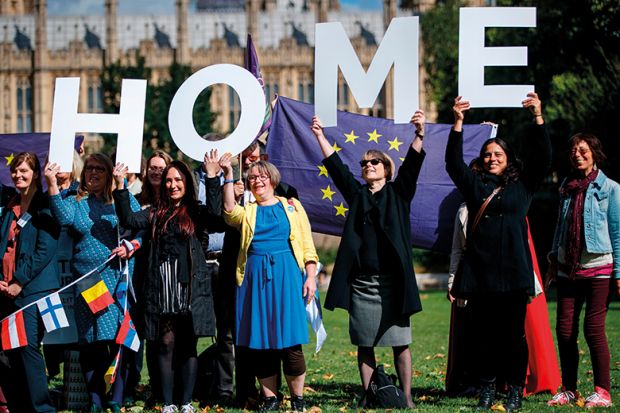When David Cameron won the 2015 British general election, Tanja Bueltmann “wrote an email to a friend saying that if he runs a referendum he would lose it”.
But while she predicted the UK’s vote to leave the European Union, she “never in a million years thought” that she and the roughly 3.7 million EU citizens living in the UK – plus the 1.2 million Britons in other EU countries – would become “bargaining chips in the negotiation”.
A professor of history at Northumbria University, Professor Bueltmann now spends most of her spare time campaigning for the rights of the “5 million people who are essentially at the heart of the EU because they exercise freedom of movement – they live the EU” and are now being “punished” for it. She has set up a campaign called EU Citizens’ Champion and produced a pamphlet for a German political foundation, the Friedrich Ebert Stiftung, about how Brexit affects the rights of EU citizens. She is also one of the most vocal advocates on social media for EU citizens’ rights.
Even while campaigning, she recognised “the overlap and relevance of my research all the time”. She has worked, for example, on Scottish as well as wider British “migration away from the British Isles to somewhere around the world. I find what is happening now very interesting…British people do not see themselves as migrants, when they are among the most prolific migrants there are.”
Professor Bueltmann also cited research that suggested that “English identity is on the whole quite weak. What is Englishness? There is hooliganism, which obviously isn’t a good way to define yourself, and then a version of the London Olympics opening ceremony, from morris dancing to a bit of Shakespeare.”
Although grateful that “Northumbria has been incredibly supportive of EU staff”, Professor Bueltmann noted that “the emails sent out by other [universities’] HR departments were quite shocking, because there wasn’t any warmth in them at all”.
Professor Bueltmann acknowledged that her advocacy had exposed her to some bitter attacks. Shortly after the referendum, Professor Bueltmann recalled, she “was walking through Newcastle and speaking on my mobile to family in Germany and was told, ‘Fuck off back to your own country!’” More recently, she has “had someone follow me in London, thankfully when I was not on my own, and after that for several days I jumped sideways if someone just happened to walk a little more directly at me”. On social media, she has had to put up with appalling abuse, “see[ing] all the time that many Brexiters generally hate experts, women and foreigners. It’s a sort of perfect storm.”
Despite the inevitable upset, Professor Bueltmann claimed to have “a fairly thick skin”, perhaps partly because she “used to be a fat child and [knew] one or two things about having crap thrown at me. That probably made a difference. There has always been someone who said some sort of nonsense to me.”
Her new public role has certainly required Professor Bueltmann to develop new skills, such as speaking to “a march of 15,000 [people] or even more”. But if emotion largely trumped evidence and argument in the Brexit vote, didn’t that leave academics rather ill-equipped to intervene?
“Being a little bit more emotive doesn’t mean you have to forget about the facts,” responded Professor Bueltmann. “It doesn’t mean you abandon objectivity, abandon your standards, [but] it does mean that you have to use the knowledge you are generating more openly to try to inform debate.”
Given that much of her earlier research had involved working with community groups, she has found it “absolutely possible to engage with Brexiters if one breaks it down to the more personal level…One of the biggest hurdles is that people think it won’t affect them, but you can speak to them about the National Health Service or who their doctors are, and then you explain to them how what’s happening now relates to those people. In many cases, there is a sort of ‘Aha!’ moment and it does really help to get people to understand what the impact is. They don’t think about their dentist or the person who cuts their hair.”
POSTSCRIPT:
Print headline: Research and thick skin are handy in fight for EU citizens’ rights
Register to continue
Why register?
- Registration is free and only takes a moment
- Once registered, you can read 3 articles a month
- Sign up for our newsletter
Subscribe
Or subscribe for unlimited access to:
- Unlimited access to news, views, insights & reviews
- Digital editions
- Digital access to THE’s university and college rankings analysis
Already registered or a current subscriber? Login








